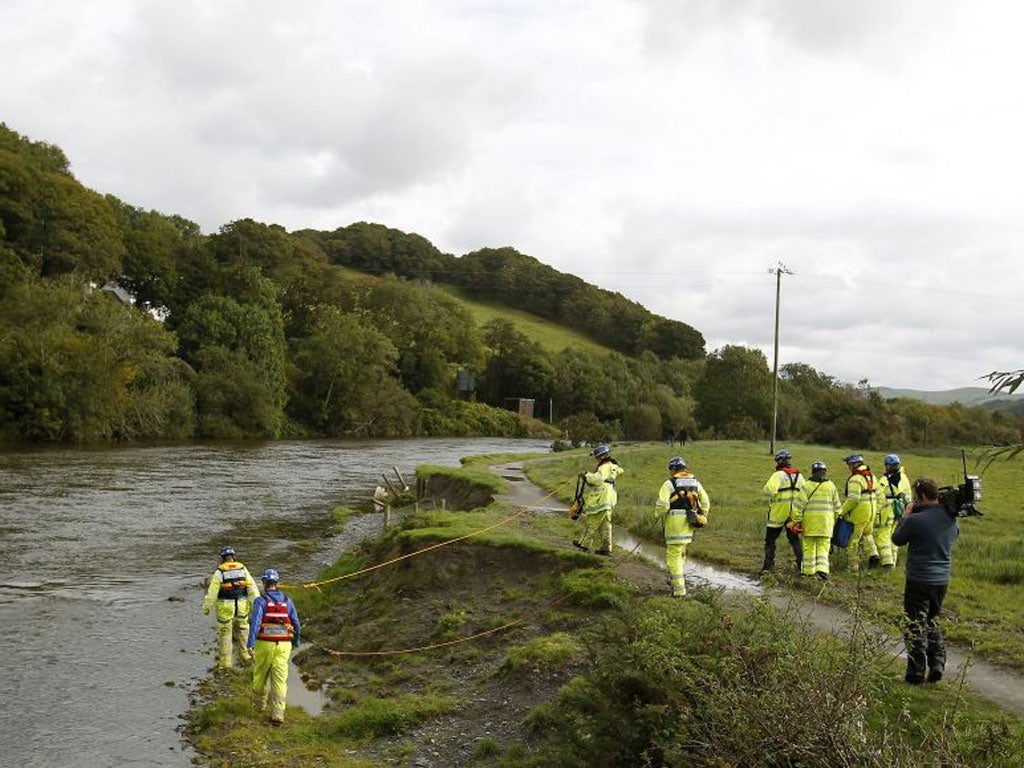Machynlleth: 'The innocence of the town has gone. Once it is lost, you don't get it back'
Jonathan Brown talks to the people of Machynlleth as they face up to tragedy

It was here in Machynlleth in 1404 on the banks of the river Dovey that Owen Glendower held his first parliament – establishing an ancient Welsh capital in defiance of the English King Henry IV.
In more recent times the pretty market town at the tip of the Snowdonia National Park has lured those looking to escape urban pressures, turning Machynlleth into a centre of alternative living, arts, crafts and vegetarian cafés. But last Monday evening the town's notion of itself as an innocent haven, a strong community where everyone looked out for each other, was shaken to its core.
As dark fell, April Jones was out playing with friends on the estate on the outskirts of town where she lived. The five-year-old was enjoying the kind of freedom that has persuaded many young families to decamp to this rainy, beautiful corner of mid Wales.
The disappearance of the child elicited an unprecedented police search and brought hundreds of volunteers from all over the country to help scour the surrounding hills in the increasingly forlorn hope of finding her.
Since the first satellite truck parked up on Tuesday morning, the town has been under a media siege. Film crews have taken up residence in the local sports hall, which has been transformed into the nerve centre of the volunteer search operation.
It is an unwanted attention achieved in the most horrific of circumstances.
The Reverend Kathleen Rogers, vicar of St Peter's, has in recent days been an articulate spokeswoman for the people of the town, where she was born and grew up. "I don't know how we will recover. But we will," she said.
The sheer scale of the media and police presence in a town of only 2,000 souls has brought a surreal air. "It is like being above everything and looking down on us below. It is a weird situation," Ms Rogers said. "At the moment we are focusing on today. Not thinking about what will happen tomorrow."
As news that the abduction inquiry had become a murder investigation swept through the town – now wreathed in pink bows, a symbol of hope and determination to find April – people wept openly. Those who had hitherto been happy to answer reporters' questions were too upset to talk.
Dai Speake, a town councillor, was returning from a police briefing where he had just learnt the news. "We have always had the hope that they would find her alive and we still have that hope," he said. "It is going to take a while for this wound to heal, if it ever does.
"Nothing like this has ever happened before and people are going to feel the shock for a long time. It is a good community and we will pull together. There are a lot of good people here. People feel safe here," he added.
In the Red Lion pub, five days without finding April persuaded some locals to question whether police had perhaps concentrated their efforts in the wrong place, and the latest development was being digested sadly.
The landlady, Claire Owen, was worried what it would mean for the community. "Everything has changed – children playing outside, people leaving their doors unlocked. Bryn-y-Gog (the estate where April lived) was very like that – neighbours dropping in during the day, children out playing together with parents keeping an eye on them," she said.
"The innocence of the town has gone. Once you lose innocence you don't get it back.
Nic Bowes, of Cardiff Metropolitan University, a forensic psychologist, said the effects could be felt by the community for some time but might also be experienced by those living farther afield.
"People might feel symptoms of trauma such as hyper-vigilance, anger and anxiety," she said.
"It is not the event itself but the meaning of the event to you. People who have young children, children with cerebral palsy, for example, might not let them play outside. But it is an experience they need to have. The community forms a massive support network. But what is right for people at the moment is to engage in activities that help them relax and feel more positive," she added.
On Sunday, the Bishop of Bangor, Andy John, will lead a service of prayers and readings for the community in Machynlleth. He said: "It is at times like this that people need their faith most and want to turn to God for help."
